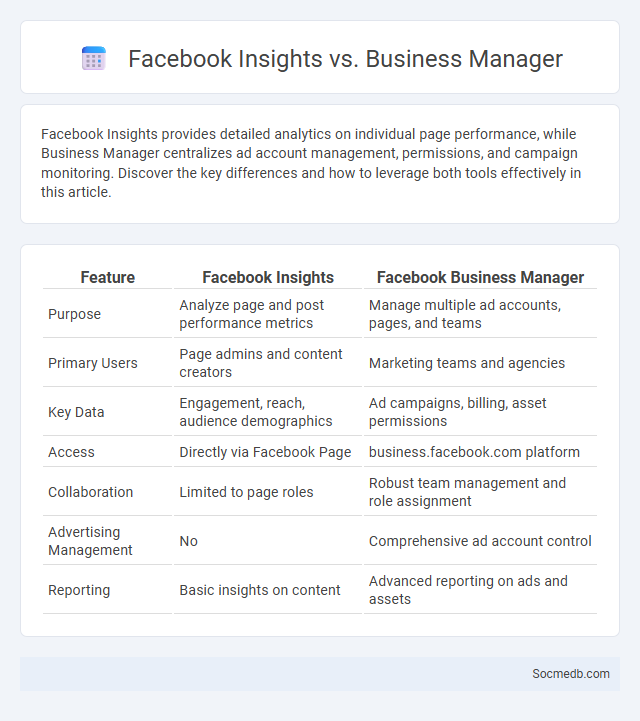
Photo illustration: Facebook Insights vs Business Manager
Facebook Insights provides detailed analytics on individual page performance, while Business Manager centralizes ad account management, permissions, and campaign monitoring. Discover the key differences and how to leverage both tools effectively in this article.
Table of Comparison
| Feature | Facebook Insights | Facebook Business Manager |
|---|---|---|
| Purpose | Analyze page and post performance metrics | Manage multiple ad accounts, pages, and teams |
| Primary Users | Page admins and content creators | Marketing teams and agencies |
| Key Data | Engagement, reach, audience demographics | Ad campaigns, billing, asset permissions |
| Access | Directly via Facebook Page | business.facebook.com platform |
| Collaboration | Limited to page roles | Robust team management and role assignment |
| Advertising Management | No | Comprehensive ad account control |
| Reporting | Basic insights on content | Advanced reporting on ads and assets |
Overview of Facebook Insights, Business Manager, and Meta Insights
Facebook Insights offers detailed analytics on page performance, user engagement, and audience demographics, enabling businesses to tailor content effectively. Business Manager centralizes account management by integrating Facebook Pages, ad accounts, and team permissions, streamlining campaign administration. Meta Insights extends beyond Facebook, providing comprehensive data across Instagram and other Meta platforms to optimize marketing strategies and track multi-channel performance.
Key Features Comparison: Facebook Insights vs Business Manager
Facebook Insights offers detailed analytics on page performance, audience demographics, and post engagement, enabling you to track your social media growth effectively. Business Manager, on the other hand, provides comprehensive tools for ad campaign management, account permissions, and asset sharing across teams. Understanding the key features of both platforms empowers your business to optimize marketing strategies and improve ROI.
Data Metrics Covered by Each Tool
Social media platforms offer various data metrics that help you analyze engagement, reach, and audience demographics to optimize your strategies. Tools like Hootsuite provide detailed reports on shares, likes, comments, and follower growth, while Sprout Social emphasizes sentiment analysis and post performance. Google Analytics integrates social metrics with website traffic data to give insights into conversion rates and user behavior from social media campaigns.
User Interface and Ease of Use
Social media platforms prioritize intuitive user interface designs that enhance ease of use, featuring streamlined navigation menus, clear icons, and responsive layouts adaptable to various devices. Simplified content sharing, quick access to notifications, and customizable settings improve user engagement and satisfaction. Consistent updates incorporating user feedback ensure interfaces remain accessible for diverse demographics, boosting overall platform usability.
Reporting Capabilities and Customization Options
Social media platforms offer advanced reporting capabilities that provide detailed analytics on user engagement, reach, and demographic trends, enabling marketers to measure campaign performance effectively. Customization options allow users to tailor dashboards and reports to specific metrics and KPIs, enhancing data visualization and decision-making processes. These features optimize social media strategies by delivering actionable insights and personalized data analysis.
Target Audiences and Accessibility
Effective social media strategies prioritize identifying and understanding target audiences through demographic, psychographic, and behavioral data analysis to tailor content that resonates deeply. Accessibility features such as alt text for images, subtitles for videos, and screen-reader compatibility ensure inclusive engagement across diverse users, including those with disabilities. Platforms leveraging these approaches enhance reach, user satisfaction, and overall communication efficacy within digital marketing campaigns.
Integration With Other Meta Tools
Integration with other Meta tools enhances social media platforms by enabling seamless data sharing and cross-platform advertising through Facebook Business Suite and Meta Pixel. This connectivity improves audience targeting, streamlines content management, and boosts campaign performance metrics across Instagram, WhatsApp, and Messenger. Leveraging Meta's ecosystem empowers businesses to maximize reach and engagement while maintaining consistent branding strategies.
Advantages and Limitations of Each Platform
Each social media platform offers unique advantages: Instagram excels in visual storytelling with robust photo and video sharing, Facebook boasts extensive user engagement and versatile content formats, and Twitter provides real-time updates and concise communication ideal for news and trends. However, Instagram's limitation includes algorithm-driven visibility that can restrict organic reach, Facebook faces challenges with misinformation and privacy concerns, and Twitter often struggles with character limits that can oversimplify complex discussions. Understanding these strengths and weaknesses helps you optimize your social media strategy for maximum impact and audience connection.
Use Cases: Which Tool Fits Your Needs?
Choosing the right social media tool depends on your specific use cases such as content scheduling, analytics, or engagement tracking. Platforms like Hootsuite excel in managing multiple accounts and scheduling posts, while Sprout Social offers advanced analytics and customer interaction features. Understanding your priorities ensures your social media efforts are streamlined and effective, maximizing your online presence.
Final Verdict: Choosing the Right Tool for Your Business
Choosing the right social media tool depends on aligning features with business goals, such as audience engagement, analytics, and content scheduling. Platforms like Hootsuite, Buffer, and Sprout Social offer tailored solutions for different needs, from small startups to large enterprises. Evaluating pricing, integration capabilities, and user interface ensures an effective social media strategy that drives growth and brand visibility.
 socmedb.com
socmedb.com